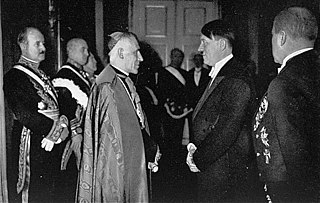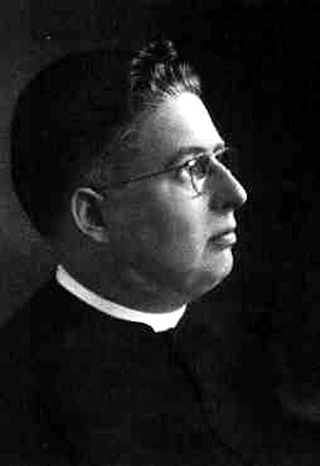Distributism is an economic theory asserting that the world's productive assets should be widely owned rather than concentrated. Developed in the late 19th and early 20th centuries, distributism was based upon Catholic social teaching principles, especially those of Pope Leo XIII in his encyclical Rerum novarum (1891) and Pope Pius XI in Quadragesimo anno (1931). It has influenced Anglo Christian Democratic movements, and has been recognized as one of many influences on the social market economy.

The Society of Jesus, also known as the Jesuit Order or the Jesuits, is a religious order of clerics regular of pontifical right for men in the Catholic Church headquartered in Rome. It was founded in 1540 by Ignatius of Loyola and six companions, with the approval of Pope Paul III. The society is engaged in evangelization and apostolic ministry in 112 nations. Jesuits work in education, research, and cultural pursuits. Jesuits also conduct retreats, minister in hospitals and parishes, sponsor direct social and humanitarian ministries, and promote ecumenical dialogue.

Alfred Friedrich Delp was a German Jesuit priest and philosopher of the German Resistance. A member of the inner Kreisau Circle resistance group, he is considered a significant figure in Catholic resistance to Nazism. Falsely implicated in the failed 1944 July Plot to overthrow Adolf Hitler, Delp was arrested and sentenced to death. He was executed in 1945.

Christian democracy is an ideology inspired by Christian social teaching to respond to the challenges of contemporary society and politics.
Quadragesimo anno is an encyclical issued by Pope Pius XI on 15 May 1931, 40 years after Leo XIII's encyclical Rerum novarum, further developing Catholic social teaching. Unlike Leo XIII, who addressed the condition of workers, Pius XI discusses the ethical implications of the social and economic order. He describes the major dangers for human freedom and dignity arising from unrestrained capitalism, from socialism, and from communism as practised in Russia. He also calls for the reconstruction of the social order based on the principles of solidarity and subsidiarity.

Democratic capitalism, also referred to as market democracy, is a political and economic system that integrates resource allocation by marginal productivity, with policies of resource allocation by social entitlement. The policies which characterise the system are enacted by democratic governments.
Catholic social teaching (CST) is an area of Catholic doctrine which is concerned with human dignity and the common good in society. It addresses oppression, the role of the state, subsidiarity, social organization, social justice, and wealth distribution. CST's foundations are considered to have been laid by Pope Leo XIII's 1891 encyclical, Rerum novarum, which advocated distributism. Its roots can be traced to Catholic theologians such as Thomas Aquinas and Augustine of Hippo. CST is also derived from the Bible and cultures of the ancient Near East.
Solidarism or solidarist can refer to:

Cristo Rey Jesuit High School (CRJ) is an independent, Jesuit, co-educational, college preparatory school in Baltimore, Maryland, Roman Catholic Archdiocese of Baltimore. It is part of the Cristo Rey Network of high schools, the original being Cristo Rey Jesuit High School in Chicago. CRJ opened in August 2007 and graduated its first class in June 2011. In partnership with the East Coast Jesuits and the Baltimore business community, the school targets lower income families of religious, racial, and ethnic diversity.
Tilman Pesch, was a German Jesuit philosopher.

Popes Pius XI (1922–1939) and Pius XII (1939–1958) led the Catholic Church during the rise and fall of Nazi Germany. Around a third of Germans were Catholic in the 1930s, most of them lived in Southern Germany; Protestants dominated the north. The Catholic Church in Germany opposed the Nazi Party, and in the 1933 elections, the proportion of Catholics who voted for the Nazi Party was lower than the national average. Nevertheless, the Catholic-aligned Centre Party voted for the Enabling Act of 1933, which gave Adolf Hitler additional domestic powers to suppress political opponents as Chancellor of Germany. President Paul Von Hindenburg continued to serve as Commander and Chief and he also continued to be responsible for the negotiation of international treaties until his death on 2 August 1934.
Christian corporatism is a societal, economic, or a modern political application of the Christian doctrine of Paul of Tarsus in I Corinthians 12:12-31 where Paul speaks of an organic form of politics and society where all people and components are functionally united, like the human body.

Friedhelm Hengsbach is a professor emeritus for Christian social ethics. He was also director of the Oswald von Nell-Breuning Institute for Economic and Social Ethical Studies of the Jesuit Sankt Georgen Graduate School of Philosophy and Theology in Frankfurt.
The German Roman Catholic Central Verein of North America, now known as the Catholic Central Verein (Union) of America, is a central body of various German Roman Catholic organizations in North America.

The University of Applied Sciences Ludwigshafen is a public university located in Ludwigshafen, Germany. It was founded in 1965 as Higher School of Commerce Ludwigshafen. In 1971 it became part of the University of Applied Sciences Rhineland Palatinate, which split up into seven autonomous universities in 1991.
Franz Jalics S.J. was a Hungarian-born Jesuit priest and author of books on Christian spirituality.

Heinrich Pesch, S.J. was a German Roman Catholic ethicist and economist of the Solidarist school. His major work, Lehrbuch der Nationalökonomie, is generally regarded as a source for Pope Pius XI's social encyclical Quadragesimo anno.

Jesuit European Social Centre (JESC), formerly known as Catholic Office of Information and Initiative for Europe (OCIPE) is a research and documentation center on ethics and European integration founded in 1956.

Martinus Joseph Hubertus Cobbenhagen was a Dutch Roman Catholic priest, economist, professor of economics and rector of Tilburg University. Son of Johannes Franciscus Hubertus Cobbenhagen, candle maker, and Maria Catharina Hubertina Ramaekers.

Rerum Novarum Centre, Taipei, increased operations in 1971 but had roots going back to Jesuit social services in Taiwan since the 1950s. The Centre tries to meet the major social and legal needs of native and foreign workers in the greater Taipei area, while also responding to emergencies and to the needs of the aboriginal peoples of Northern Taiwan.













